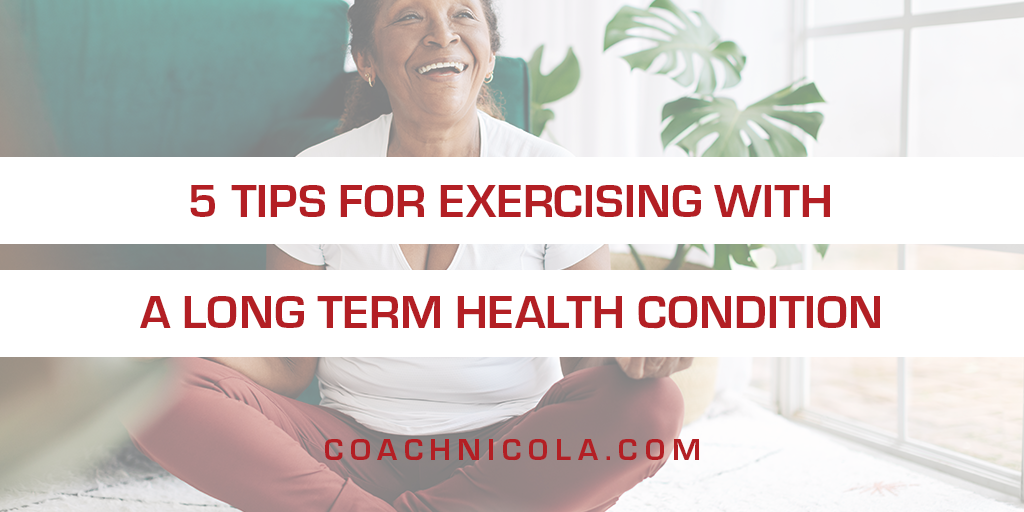
Tips for exercise with a long term health condition

If you have a long term health condition you may have been told that exercise can help manage it. But you might be wondering where to start.
Here are my tips for exercising with a long-term health condition. Tips that will help to make exercise a sustainable choice for you.
Check in with your health care provider
When you have a long-term health condition it is always wise to check in with your doctor or health care provider before you start exercising.
Whilst for the majority exercise is going to be very beneficial, there are times when it is best not to exercise. Such as if your condition is unstable or it has only just become manageable, If so, you may be advised that exercise should wait until your condition is well managed. There may also be types of exercise that aren’t recommended.
Don’t be surprised if your fitness professional asks for a letter from your GP before you start. As a coach specialising in supporting people with long term health conditions it is important to me that your exercise programme is appropriate for you. And having a clear understanding of your condition will help me work with you better.
Be Realistic
When it comes to exercising with a long term health condition there is nothing wrong with starting slow and building up gradually. And in fact, this is good advice whether you have a condition or not.
By working from your current fitness level you will build a foundation of strength and fitness to progress from. Which will help to manage your condition in the long term.
If you had been active before your diagnosis, starting slow will give you time you to find out how strong you are now and what you are capable of. It will also give you a solid foundation from which you can progress in a sustainable way.
Have options
Depending on your condition, some days you might have loads of energy. Others, not so much. So it makes sense to have options when it comes to exercise.
For many of my clients I have alternative plans for when energy isn’t as high. This might be more seated exercises rather than standing. Or a session focusing on mobility and flexibility. Or perhaps a release session with stretches and self-massage.
Having options means even on days when energy is low, you can still bring movement to your body which is nourishing and makes you feel good.
It all counts
Don’t think that it only counts if you sweat or get out of breath.
Sessions where you work on your mobility might not make you sweat but can help you move with more ease.
Likewise exercises that concentrate on big meditative breaths may not build aerobic strength. But they bring a sense of calm which can help with anxiety and stress.
All movement is good, including things that feel “easy”.
Adding more movement to your daily activity can make a huge difference, especially if you are usually quite sedentary. Standing more, increasing your steps, dancing in the kitchen, getting out into the garden, are all ways you can add movement to your day.
The We Are Undefeatable campaign has some great ideas on different ways to add movement to your day.
And it all counts.
Don’t forget about rest
Rest and recovery is an often overlooked part of exercise. This is true whether you have a long term health condition or not!
Rest is when your body adapts to the exercise and gets stronger, so it is really important.
Allowing time for rest also gives the body time to recover so you are ready for the next session. How much rest and recovery time you need will depend on your condition, your fitness levels and your own individual needs.
But if you start to notice that you can’t do as much as you did a few weeks ago, then give yourself a little bit more recovery time.
Exercise and being active can play a big part in managing your long term health condition. If you have a chronic illness and want to start exercising safely to improve your overall health, then get in touch.
As a specialist coach supporting people with long term health conditions I can help you get fitter, stronger and healthy in a safe way. 121 sessions can either be in the Aylesbury and Bicester areas or online via Zoom.

Leave a Comment
(0 Comments)